 |
 |
 |
 |
| |
||||
On The Verge Of A Cancer Cure? Part IIIChildhood Cancers 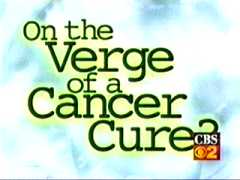 The treatments have made them bloated, caused their hair to fall out and made them very sick. The treatments have made them bloated, caused their hair to fall out and made them very sick. They are the youngest victims of cancer and diseases like it. There is a race within the medical community to try to find a cure for the cancers that attack children. CBS 2 News' Jonathan Elias will show you the latest treatments in the fight to save these young lives. Special Assignment: On The Verge Of A Cancer Cure? Part III aired Tuesday, April 21, 1998 at 11 p.m. Part I aired Sunday, April 19, 1998 and Part II aired Monday, April 20, 1998 A new procedure, called the umbilical cord blood transplant, could change how this disease is attacked, reported CBS 2 News' Jonathan Elias. At the bone marrow transplant ward of Children's Hospital of Los Angeles, kids are fighting for their lives. They receive blood transplants at the hospital, but must be kept germ-free because of the massive radiation and chemotherapy treatments they must go through before they receive their new blood. As a result, their immune systems become very weak, said Elias. At two-and-a-half years old, Jonathan Leon desperately needed what many cancer patients require to stay alive -- a marrow transplant. But as Jonathan got weaker, doctors offered his mother new hope. A marrow match was found for Jonathan but the source for the blood necessary for the transplant came from something doctors have routinely thrown away in past years. Scientists discovered newborns' umbilical cords are filled with enough blood to provide such a transplant, said Elias. And in Jonathan's case, the new treatment offered him a 50-50 chance of survival. Without the new procedure, doctors say Jonathan would not have had a chance of living at all. Since the 70s, Dr. Neena Kapoor has treated children suffering with cancer. She says the umbilical cord blood procedure is a major breakthrough because it gives doctors a new weapon to fight off the cancer. There is also more hope. Doctors are working quickly to find other treatments and one of them is a drug known as BSO -- buthionine sulfoximine -- a drug that's been around a while but is now being tested in young cancer patients, said Elias. In a very few test cases, BSO has been added to traditional chemotherapy. BSO has shown signs of being able to break down tumors. Another less-toxic treatment is about to be announced by the Children's Cancer Group and doctors at Children's Hospital, said Elias. Recent tests with vitamin A are showing promising results in treating certain cancer tumors. "It never makes it easy when you lose a child even though you've been in the field a long time," Dr. Kapoor said. "It's still equally painful as it has been before. But each time you find a new avenue to go in and fight that dreadful disease, we all get excited." Jonathan is currently recovering from his transplant and like every transplant patient, the wait begins to see if the new blood thrives. "Now it's just a waiting game and you have to be very patient and pray every day and hope my son makes it through this," said Jonathan's mother. Prayers, however, do get answered. Two-year-old Jesse was lucky enough to have received a transplant using umbilical cord blood 16 months ago. And today he seems to be winning his fight for life, said Elias. His mother says the medical breakthroughs are a miracle. "Technology has come so far it saved his life which it wouldn't have many years ago," Jesse's mother told CBS 2 News. Contact information:
On the Web:
|
|
 |
|

 |
||
|
12 p.m.
Woman 2 Woman One of the stars from "Judging Amy" 5 p.m. 6 p.m. 11 p.m.
|
||
 |
||
|
4-5 p.m.
Judge Judy Ruler Of The Free World! 8:00 p.m. 8:30 p.m.
9:00 p.m.
|
||
| |
||
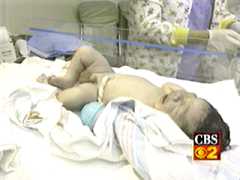 Leukemia is the number-one cancer in children but for the first time in decades, science is offering young patients some hope.
Leukemia is the number-one cancer in children but for the first time in decades, science is offering young patients some hope. 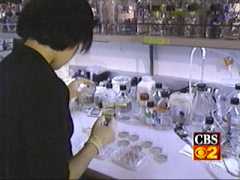 "It's a chance for them to live, parents have to do anything," Jonathan's mother told Elias. "I would do everything for my son. For me, it's very hard to see my son sick."
"It's a chance for them to live, parents have to do anything," Jonathan's mother told Elias. "I would do everything for my son. For me, it's very hard to see my son sick." 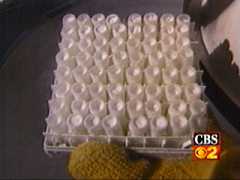 "The quantity of blood could be anywhere from 40cc to 240cc in that cord and placenta," Dr. Kapoor told CBS 2 News. "So you can collect that much blood that is adequate (enough) that it carries enough seed cells for a blood-forming system to reconstruct somebody else's blood forming."
"The quantity of blood could be anywhere from 40cc to 240cc in that cord and placenta," Dr. Kapoor told CBS 2 News. "So you can collect that much blood that is adequate (enough) that it carries enough seed cells for a blood-forming system to reconstruct somebody else's blood forming." 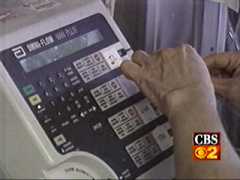 "We understand more about cancer, we understand more about the diseases," said Dr. Kapoor. "We have better means of treating it. Will we be able to treat every single cancer? I don't think so. In the majority of the cases I think we'll make major advances.
"We understand more about cancer, we understand more about the diseases," said Dr. Kapoor. "We have better means of treating it. Will we be able to treat every single cancer? I don't think so. In the majority of the cases I think we'll make major advances. 

